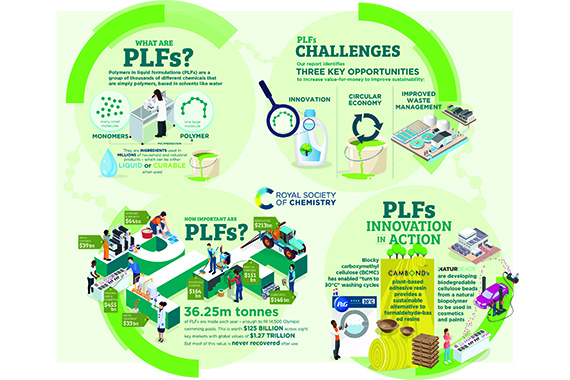
BASF, the world’s largest chemical company, has joined the Royal Society of Chemistry’s task force comprising a who’s-who of the sector aiming to make a polymers industry worth US$125bn annually more sustainable.
Unilever, Croda, Scott Bader, Crown Paints and Afton Chemical are among those already signed up to the RSC’s initiative, which aims to create a circular economy for a group of thousands of chemicals called polymers in liquid formulations, often referred to as PLFs.
Leading the group will be Professor Roy Sandbach OBE FRSC, the immediate past president of the RSC’s Industry and Technology Council, who becomes interim chair. Prof Sandbach led the development of the regional innovation strategy for the North East of England and previously held global R&D positions with Proctor and Gamble during a 31 year association with the company.
PLFs have a number of practical uses and are found in millions of products, from paints, adhesives and sealants to fertilisers, lubricants and cosmetics. They are also used in water treatment, ink production and household cleaning products such as washing detergent.
Dr Geoff Mackey FRSC, BASF UK & Ireland Sustainability Director said: "At BASF, our corporate purpose is ‘We create chemistry for a sustainable future’. We want to contribute to a world that provides a viable future with enhanced quality of life for everyone. We do so by creating chemistry for our customers and society and by making the best use of available resources. Polymers in liquid formulations is a theme that cuts across many of our core markets and technologies. Whether it’s dispersions for paints and adhesives, crop protection products, home and personal care ingredients, or the many other applications in which they are formulated – we want to ensure that we continue to benefit from their use without impacting on the planet or its people.”
Professor Sandbach said: "Polymers are important building-blocks for a myriad of everyday products, but unlike plastics they’re hidden from ‘sustainability view’. We need to change this. We need a concerted multi-sector and supply chain effort to look for technical innovation that reduces polymer impact and we need to drive a clear strategy to action. Now.
"The task force needs to establish open and common goals. A first and crucial task for me and my colleagues. We can’t dabble on this, we need to think big and act big. For me there are challenges along two vectors, technology innovation and business model innovation. Action on both will be the only way to ensure that innovation is delivered, to benefit us all.”
There are very few ways to recycle PLFs, but with more than 36.25million tonnes not recovered after use every year – enough to fill Wembley Stadium 32 times – the task-force’s aim is to develop ways to recover, reuse and remake these materials as well as developing biodegradable or naturally sourced alternatives.
Professor Tom Welton, President of the Royal Society of Chemistry, said: "Welcoming BASF to a task force that already counts Unilever, Croda, Scott Bader, Crown Paints and Afton Chemical among its members is a huge indicator of the strength of our collaborative approach. We’re looking forward to giving PLFs the attention they’re long overdue with this globally influential group.
"Until now, PLFs have not been focussed upon because they are ingredients rather than products, which makes them technically challenging. It is their flexibility and usefulness that makes them so prevalent – and it’s that prevalence that drives our call to develop solutions that fit within a circular economy model and creating sustainable alternatives. Doing so would offer colossal sustainability benefits – but this will require the concerted action of academia, industry and civil society.”
PLFs are incredibly useful. As ingredients, they are often soft and rubbery, and have several practical applications, such as helping paints stick to surfaces and enabling detergents to wash clothes at 30oC rather than 40oC, reducing energy consumption.
As such, the market is technically diverse and complex, comprising hundreds of different polymer types within the categories of acrylic, epoxy resins, polyesters, polysilicones, polyurethanes, radiation curable, vinyl, water-soluble and other low volume polymers. Because of their usually high molecular weight, in terms of toxicity polymers are generally considered as being of low environmental concern. They are currently exempt from registration and evaluation within REACH, but this exemption is currently being reviewed by the European Commission.
Driven by the RSC’s report Polymers in Liquid Formulations: opportunities for a sustainable future, the task force will map out a sustainable future for PLFs and establish clear industry leadership regardless of regulatory drivers. It forms part of the RSC’s Synergy programme to unite businesses around complex chemistry based challenges affecting multiple industries and supply chains.
The task force will convene this year to launch a plan for action in 2022, initially focusing on five key areas:
- Establish new innovation networks that promote collaboration between academia, industry and policy
- Identify and champion key research themes and priorities that will support researchers and businesses to tackle PLF innovation challenges
- Explore the emerging need for a consistent approach to PLF biodegradability and stability testing
- Investigate opportunities for chemistry-based innovations in developing circular economy solutions in key markets such as paints, adhesives and sealants
- Engage with key stakeholders to ensure that a science- and evidence-based approach is used to develop future policy for PLFs
Cross-sector sustainability initiatives driven by academic communities, SMEs, policymakers and funders will also play a vital role in accelerating and de-risking the innovation needed to reduce reliance on fossil-derived feedstocks, reduce waste generation and maximise the value of PLFs in liquid and curable formulation systems.
Jason Harcup, Global Vice President for Research and Development Skin Care at Unilever, said: "Making a sustainable shift towards the circular economy requires close collaboration across the chemistry ecosphere, so we are delighted to join the task force and be part of the solution. By bringing together the latest material science and technology, we can create new innovations that further improve ingredients and formulations used in everyday products for the benefit of people and the planet.”
Ian Bell, Senior Research and Development Director at Afton Chemical Ltd, said: "Polymers in Liquid Formulations are a critical constituent to many materials and substances used in society, often without any real awareness of their presence, role or criticality. This is true within the lubricants industry, where this class of materials plays a key role in maintaining the chemical and physical properties necessary to keep vehicles moving effectively and efficiently. Establishing a sustainable long term future for such solutions is critical.
"With issues as complex and far reaching as the RSC initiative embraces, the engagement of multiple stakeholders and participating parties is essential, from academia and cross-segment industries in order to share capabilities and insights, collaborate and help to direct future actions in a more effective manner. Afton is delighted to be part of this initiative, support the RSC in this way and to collaborate with industry colleagues to make a meaningful impact in this area.”
Kathryn Tormay, Group Leader Wallpaints Research and Development at Crown Paints, said: "We have always known that post-consumer waste is an industry issue which is why we have many initiatives to take back and reuse paint were possible. However, we can go further which is why we have taken the opportunity to join the PLF task force. We believe by collaborating across industries we can tackle the key challenges set out by the RSC and be at the forefront of innovations and solutions to an industry wide issue.”
Mark Cooper, Group Chief Technology Officer at Scott Bader, said: "Polymers have a critical role to play in solving future challenges across society and we welcome this initiative to drive collaborative industry action to improve the sustainability of PLFs, enabling a more sustainable future for all."
Damian Kelly, Vice President Technology and Innovation at Croda, said: "Croda is committed to sustainability and the PLF Task Force is an excellent opportunity to bring industry together to set a sustainable course for thousands of polymers, with the RSC’s priorities providing a framework to drive collaborative leadership and innovation in this field. Croda is an active member of the RSC and we are excited to be part of this Task Force, as we believe our continued success and positive impact on the world is driven by the strength of our relationships, with sustainability at the heart of what we do."
Those wishing to read the report can find out more by visiting rsc.li/PLFs.




